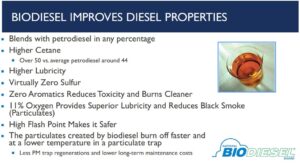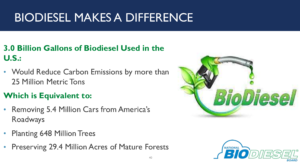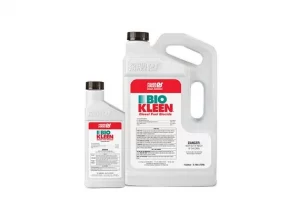What is Biodiesel?
Biodiesel is environmentally friendly and produced from various renewable sources (also known as feedstock), including plant oils (soybean), recycled cooking grease, and/or various animal fats. Transesterification is a chemical process that combines an alcohol source and the feedstock to convert the biomass feedstock into fatty acid methyl esters (FAME). This process produces two byproducts: methyl esters (biodiesel) and glycerin, which are then used in many products.
The estimated biomass-based diesel fuel feedstock use in 2019-2020 was 46% soybean oil, 15% distillers corn oil, 15% yellow grease (recycled cooking oil), 13% animal fats, and 11% canola oil (meaning that 46% of all biodiesel produced was made with soybean oil, 15% distillers corn oil, etc.).
What is B20 Biodiesel?
B20 is the most common biodiesel blend. But is it safe to use B20 biodiesel for your truck? Are all gas stations switching to biodiesel? If you have ever wondered about this, you are not alone. These are some of the most frequently asked questions by diesel pickup owners in the states. With the nationwide deployment of B20 biodiesel, we hope to address any concerns or questions that our fellow diesel truck drivers may have.
B20 biodiesel is a blend of 20% biodiesel and 80% petroleum-based fuel (petrodiesel, also known as diesel #2), which reduces carbon dioxide emissions and petroleum dependence. This blend meets the ASTM D7467 petrodiesel standard. All biodiesel blends must meet the ASTM requirements for authorized diesel fuel. And you can rest assured that the mixture of diesel #2 and biodiesel meets the required specifications. In fact, in some of the required specifications, biodiesel actually outperforms ultra-low sulfur diesel.
Can you use B20 biodiesel in your diesel pickup?
The short answer is yes. Most diesel pickup owners can use B20 biodiesel fuel with no modifications. B20 biodiesel is the best substitute for ultra-low sulfur diesel #2, and both fuel types can be combined. Currently, 78% of diesel vehicles being produced are OEM approved for B20 biodiesel fuel use.
Prior to 2010, many manufacturers, including Ford, Chevrolet, and Dodge, did not utilize B20 biodiesel. Most OE manufacturers only recommend biomass blends containing no more than 5% biodiesel because that was the most common at the time. We believe that any biodiesel blends up to 20% is safe to use (if your owner’s manual allows for up to 5%, you can consider 20% equally safe).
The benefits of using B20 biodiesel (or higher blends)
Using B20 biodiesel or other renewable diesel fuels has numerous environmental advantages. Whether you own a Ford F-series, a Chevy/GMC Duramax, a Dodge Cummins, or any other diesel truck, here are three reasons you should use B20 biodiesel in your vehicle.
1. Lubricity
Lubricity is often defined as a lubricant’s (fuel) ability to reduce friction between and damage to surfaces in relative motion under load. This includes injection pumps such as fuel injectors, fuel lift pumps, and high-pressure fuel pumps for diesel pickup owners.
Recent HFRR (high-frequency reciprocating ring) tests revealed that #2 diesel passed the maximum wear scar diameter (maximum of 520-micron wear), with results as high as 490, while B20 biodiesel results were around 310 (a 45% improvement). According to experts, biodiesel blends as low as .25% can significantly improve lubricity.
2. Cetane
The cetane number measures the ignition delay (the time it takes for fuel to enter the combustion chamber and ignite); higher cetane numbers are thought to provide easier starting and quieter operation. Therefore, diesel pickup truck owners should look for any opportunity to increase cetane numbers safely.
Conventional diesel fuel must have a minimum cetane number of 40, while B100 biodiesel must have a minimum of 47. The cetane number in biodiesel is determined by the feedstock used to produce the biodiesel. Animal fats and canola oil naturally have the highest cetane numbers; when blended with petrodiesel at 20%, B20 biodiesel has a cetane increase of more than 10 points over standard diesel.
3. Emissions
When using B20 Biodiesel, older model diesel pickup trucks see emissions reductions of up to 20%. However, diesel vehicles equipped with an SCR (selective catalyst reduction) system or a DPF see no measurable improvement in air quality.
Biodiesel is biodegradable, non-toxic, burns cleaner than petroleum diesel, and is better for your health. Biodiesel reduces black smoke and soot (which extends the life of turbochargers, EGR coolers, EGR valves, and many other components), carbon monoxide, and harmful unburned hydrocarbons cause smog when compared to petrodiesel. In addition, an 11% oxygen content in B20 Biodiesel results in lower exhaust particulates that burn at lower temperatures, resulting in less frequent regeneration and a longer life for your SCR/DPF.
Risks involved with using B20 Biodiesel
While there are currently no significant risks associated with using B20 Biodiesel, we recommend taking the following precautions
1. Fuel Filter Replacement every 6 months
Biodiesel’s chemical esters can have solvent-like cleaning properties, similar to parts cleaning solvent tanks. Biodiesel blends with lower percentages (B5 biodiesel or 5% bio) have almost no solvent effect, but B20 may have a solvent-like effect that can clean any debris or deposits in the fuel system, resulting in deposits in the engine and fuel system that contaminate fuel filters more frequently. To reduce the risk of plugged or contaminated fuel filters, we recommend servicing your fuel filters every six months.
2. B20 Biodiesel in cold weather
When compared to standard diesel no. 2, biodiesel and biodiesel blends have a higher cloud point (the temperature at which crystals begin to form). If you own a diesel pickup truck and live in a cold climate, you should be in the habit of adding a winterizing fuel additive during the colder months; the same procedure should be followed if using biodiesel or biodiesel blends, which will eliminate the risk of fuel gelling at higher temperatures.
3. Biodiesel Storage and Stability
While the risks of pumping “bad” biodiesel aren’t any greater than getting a tank of lousy petrodiesel, you should still take some precautions when using B20 Biodiesel.
There are three major risks associated with biodiesel storage and use, where a fuel tank may last six months or longer. The higher the cloud point (as discussed above), the water content of biodiesel blends, and microbial degradation and oxidation. For most diesel pickup owners, these issues are insignificant; we burn through a tank of fuel in a matter of weeks, and when combined with an “everyday” type of fuel additive, we face the same risks as standard diesel fuel.
If your diesel pickup or equipment (generator or other equipment) sits for an extended period of time (a tank of fuel lasts you more than six months), you should be aware of the risks and take the necessary precautions. Oxidation and algae are two major storage issues for B20 Biodiesel or higher percentage biodiesel. Using a biocide fuel additive and a diesel fuel stabilizer additive is the only way to reduce or eliminate these risks. Combined, both additives will help extend Biodiesel’s storage life, whether it is a blend of pure Biodiesel.
Final thoughts
While biodiesel’s mechanical benefits pale compared to the environmental benefits, they have secured biodiesel’s place at the top of the alternative fuels list, indicating that 
Although biodiesel and biodiesel blends aren’t for everyone, B20 biodiesel is the best alternative fuel to petroleum and should be embraced! With minimal effort on the part of the consumer (adding a fuel additive is something you should do even with diesel #2!) It will not only provide much-needed competition for oil companies, but it will also, hopefully, save our environment and our wallets, albeit in small steps.
Stay tuned for our follow-up blog on frequently asked questions about biodiesel, and if you have any questions, you can contact us here or schedule a fuel filter service with us at our diesel repair shop in Orange County.



